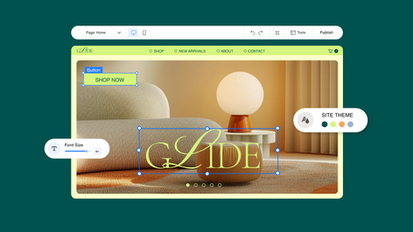Build Small Business Website Explained
What Is Build Small Business Website?
Build Small Business Website
Search Engine Optimization (SEO) is a crucial aspect of any website design, and incorporating SEO practices into web design is essential for driving traffic and improving search engine rankings. SEO web design involves creating websites that are optimized for search engines, making it easier for users to find your site when searching for relevant keywords.

Build Small Business Website
Build Small Business Website
1. Wix
Wix is a popular website builder that offers a wide range of templates designed for churches and religious organizations. With its drag-and-drop interface, users can easily customize their website to reflect their unique style and branding. Wix also offers a variety of features such as event calendar integration, online donation tools, and media galleries for sermons and other resources. Additionally, Wix provides reliable hosting services and SEO tools to help churches reach a wider audience online.
2. Squarespace
Squarespace is another user-friendly website builder that is well-suited for churches looking to create a modern and visually appealing website. With its stylish templates and customizable design options, Squarespace allows users to create a professional-looking site without any coding knowledge. Squarespace also offers features like event scheduling, donation forms, and social media integration, making it easy for churches to engage with their community online. Additionally, Squarespace provides responsive design capabilities, ensuring that your website looks great on any device.
3. Sharefaith
Sharefaith is a website builder specifically designed for churches, offering a comprehensive suite of tools and templates to help churches create a strong online presence. Sharefaith’s templates are tailored for churches and religious organizations, featuring customizable layouts and designs to suit any style. In addition to website building tools, Sharefaith also provides features such as sermon hosting, online giving options, and church management tools. Sharefaith also offers a library of resources including graphics, videos, and worship media to help churches enhance their online presence.
4. WordPress
WordPress is a versatile platform that can be used to create a wide range of websites, including church websites. With its extensive library of themes and plugins, users can easily customize their website to meet their specific needs and preferences. WordPress offers features such as event calendars, donation forms, and sermon hosting capabilities, making it a great choice for churches looking to engage with their congregation online. Additionally, WordPress is known for its robust SEO capabilities, helping churches improve their visibility in search engine results.
5. Weebly
Weebly is a user-friendly website builder that offers a range of features suitable for churches and religious organizations. With its drag-and-drop interface and customizable templates, users can easily create a professional-looking website without any coding knowledge. Weebly also provides features like event calendars, donation forms, and video hosting capabilities, making it easy for churches to share resources and connect with their community online. Weebly also offers reliable hosting services and responsive design options, ensuring that your website looks great on any device.
Web development can be broadly categorized into two main areas: front-end development and back-end development. Front-end development focuses on the visual aspects of a website, such as layout, design, and user interface. This involves using languages such as HTML, CSS, and JavaScript to create engaging and interactive user experiences. Back-end development, on the other hand, involves working with databases, servers, and application logic to ensure that a website functions properly. This often involves using languages such as PHP, Python, and Ruby.
One of the most important aspects of web development is responsive design. With the increasing use of mobile devices to access the internet, it is essential for websites to be optimized for all screen sizes. Responsive design ensures that a website looks and functions correctly on desktops, laptops, tablets, and smartphones. This involves using techniques such as fluid grids, flexible images, and media queries to create a seamless user experience across all devices.
In addition to responsive design, web developers also need to consider web accessibility when building websites. Web accessibility refers to the practice of making websites usable for people with disabilities, such as those who are visually impaired or have motor impairments. This involves using semantic HTML, providing alternative text for images, and ensuring that websites can be navigated using a keyboard. By making websites accessible to all users, web developers can ensure that everyone can access and use their websites.
When it comes to front-end development, one of the most popular frameworks is Bootstrap. Bootstrap is a front-end framework that allows developers to create responsive and mobile-friendly websites quickly and easily. It provides a set of pre-built components, such as buttons, forms, and navigation bars, that can be easily customized to fit the design of a website. Bootstrap also comes with a grid system that makes it easy to create responsive layouts that adapt to different screen sizes.
Another essential tool for front-end development is JavaScript, which is a programming language that allows developers to add interactivity and functionality to websites. JavaScript can be used to create animations, validate forms, and interact with APIs to fetch data dynamically. One of the most popular JavaScript libraries is jQuery, which simplifies common tasks such as DOM manipulation and event handling. More recently, frameworks like React and Angular have gained popularity for building dynamic and interactive web applications.
On the back-end side, one of the most widely used technologies is the LAMP stack, which stands for Linux, Apache, MySQL, and PHP. The LAMP stack is a popular open-source software stack that is often used to build dynamic websites and web applications. Linux is the operating system, Apache is the web server, MySQL is the database management system, and PHP is the server-side scripting language. Together, these technologies allow developers to create powerful and scalable web applications that can handle high traffic loads.
In recent years, there has been a shift towards using modern web development tools and technologies, such as Node.js and MongoDB. Node.js is a runtime environment that allows developers to write server-side code using JavaScript, making it easier to build real-time web applications. MongoDB is a NoSQL database that is designed for scalability and flexibility, making it ideal for handling large amounts of data in web applications. By using these modern technologies, web developers can create fast, efficient, and secure web applications that meet the demands of today’s users.

Build Small Business Website Trends
Build Small Business Website
Overall, a random website generator can be a great way to discover new and interesting content online. Whether you are looking for a fun distraction, seeking to broaden your horizons, or simply wanting to explore the vast world of the internet, a random website generator can provide a fun and exciting way to do so. So why not give it a try and see where the internet takes you next?


